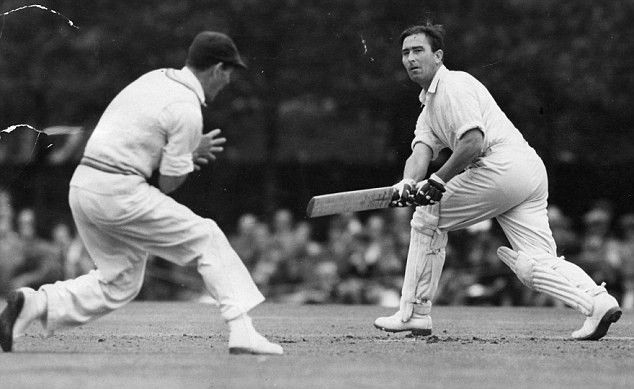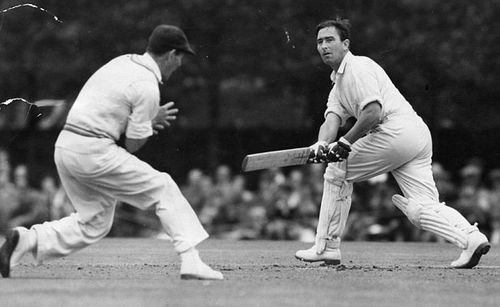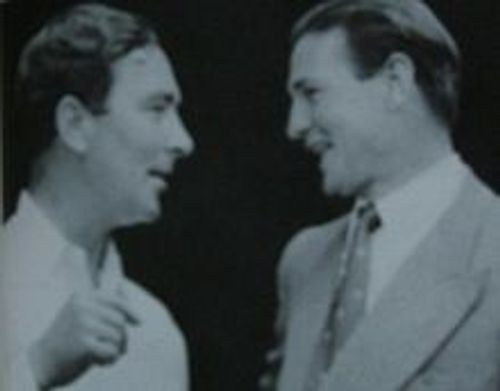
When an English cricket legend played in the Ranji Trophy
In its 81 year history, the Ranji Trophy has seen participation by some of the best players in world cricket history. However there have been very few foreign players who have played in the tournament and one standout name is that of legendary English batsman Denis Compton.
Considered by many as one of the finest English batsmen ever, Compton grew up in London playing cricket as well as football and he went to represent Arsenal as a winger in the first division of English football league and the England team in unofficial football matches.
But it was in the sport of cricket that the player made his mark. Making his Test debut at the age of 19, Compton scored 65 against the visiting New Zealand side at The Oval, and not too long after that scored his first Test century against Don Bradman’s Aussie side at Trent Bridge in just his second Test. Compton played 78 Tests over a 20-year period and ended with 5807 runs, often scored with breathtaking attacking batting with a very impressive average of 50.06.
But his Test career saw a gap of 7 years between 1939 and 1946 because of a serious knee injury sustained while playing for Arsenal and later the Second World War during which he served in India on British Army duty as a Sergeant Major.
The highest scoring Ranji final of the times
Compton was posted at Mhow, which was in the state of Holkar and when C. K. Nayudu, former India captain and then the captain of the Holkar cricket team and also a Colonel in the Holkar Army, got to know about it, he quickly moved to persuade Compton to play for the side in the 1944-45 season. Compton, who had previously played cricket and football on a army tour to Burma during his India stint, was given permission by his commanding officer to take a few days off to play cricket.
Compton’s participation for Holkar was limited in the initial stages of the competition because of army duties and he played only game (against Bengal; scored 22) before the semi-final. He was included in the team to play Madras at Chepauk and Compton top-scored in the match with a first-innings knock of 81 as Holkar defeated the hosts by 10 wickets to book a place in the final at Brabourne Stadium against Bombay.
In a high scoring match which was played in the timeless format, the hosts Bombay scored 764 (led by a magnificent 278 from the captain Vijay Merchant, aided with centuries from Rusi Modi and Rustom Cooper) to set a daunting target of 867 to chase for the visitors if they had to win the trophy after conceding a first-innings lead of 102 (Compton scored 20 in the first-innings).
The start was far from ideal for the Holkar side as they lost both openers with the score at 12, and Compton came out to bat to join Mushtaq Ali at the crease. The duo put on a 209-run stand to ignite some hopes of an unlikely win, before Mushtaq got out. Wickets kept falling at the other end while Compton continued accumulating runs, but all likelihood of a win seemed over when the team was at 383-9, still 484 runs short of the target, and number 11 batsman O. P. Rawal came to the crease to join Compton.
The last wicket pair put on 109 runs, out of which just 7 came from the bat of Rawal, before the tail-ender was dismissed leaving Compton stranded on 249* and the Holkar side losing a high scoring game by 374 runs. With a total of 2078 runs scored in the match, it was a record in first-class cricket at that time.
“Mr Compton, you are a very good batsman. But you must go.”
There is an interesting story about the game which Compton later shared. He said that he was approached by a wealthy local business Seth Hiralal, who offered him Rs 100 (£7.50 approx at that time) for every run Compton scored after passing his century. Realizing that the amount could convert into a good earning from a single knock, Compton used it as a motivation to score runs in the innings and he later described that when Rawal was dismissed, he didn’t respond to the applause he got for his majestic knock and was instead calculating how much he had earned and how he would use that “princely” amount.
When he went to meet Hiralal after the match, he noticed that the businessman was nowhere to be seen and there was an envelope for Compton placed. Still wondering how he would best use the reward, Compton opened the envelope to find there wasn’t any cash and only a note mentioning that Hiralal had to rush back to Indore on some urgent business, and after that incident Compton never heard from Hiralal ever again.
Compton later played for the Europeans’ team in the Bombay Pentangular in the 1945-46 season and also represented East Zone against the touring Australian Services side at Eden Gardens. The game saw a memorable incident in the fourth innings, when the East Zone team who were given a target of 280 to win the match, saw Compton spearhead the chase.
Compton was batting on 98 when there was a disruption caused by some students fighting for the freedom movement. The leader of the student group walked up to Compton and politely told him “Mr Compton, you are a very good batsman. But you must go.”
This conversation was overheard by Aussie Keith Miller, who went on to become a very close friend of Compton (their friendship recognized by English and Australian Cricket Boards by naming the Best Player of the Ashes award as Miller-Compton Medal) and Miller would always welcome Compton to the crease in future Ashes matches with a customary “Mr Compton, you are a very good batsman. But you must go.” The play at Eden Gardens are halted for some time before resumption and Compton got his century and got dismissed for 101 soon after. His efforts however didn’t go in vain as the East Zone side won the match by 2 wickets.
Compton played three Ranji Trophy matches and 7 other games during his stint in India between 1944 and 1946. In the 10 matches, he scored over 1300 runs at an average of 87, which included 7 centuries. He resumed his Test career in England in 1946, coincidentally in a series against India (was dismissed for a first ball duck by Lala Amarnath) and went on to score runs in plenty in international cricket to cement his name among the all-time cricket greats.
Denis’s grandson Nick Compton made his Test debut for England against India at Ahmedabad in 2012.

